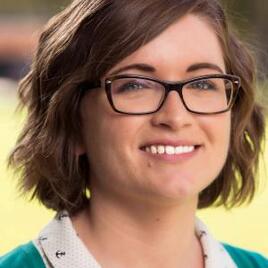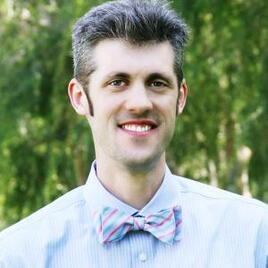Search
Search
How the UCR Library launched the career of alumna Sara Seltzer '08
Currently an institutional archivist for The J. Paul Getty Trust, the world's largest cultural and philanthropic organization dedicated to the visual arts, class of ’08 alumna Sara Seltzer began her career as a UCR Library student employee in Special Collections and University Archives.
“I’ll never forget when I got that job,” Seltzer said. “I came home that day and told my parents about it and my dad was like, ‘This is the start of your career!’ And I said, ‘I guess it is!’”
From a young age, Seltzer’s family instilled a love of history and literature into her life. “My mom in particular is a huge history buff and culture fiend,” she said. “Growing up we always went to museums, we always did lots of cultural things. I had influential people who exposed me to the kinds of environments where archives live.”
Her grandmother was a Cuban refugee who later worked in the corporate library for Southern California Edison, which also inspired Seltzer’s career goals. “That was her favorite job,” she explained.
Her academic studies at UC Riverside focused on European history and art history, while at the library Seltzer felt most passionate about working with archives tied to British history. “I’m a huge Anglophile, so that was exciting,” she said of working with the Ann Harris correspondence in 2009, among other projects for Special Collections and University Archives.
As a student employee, she appreciated the autonomy that her supervisors gave her, as it helped to build confidence in her own judgment and critical thinking skills. “Since I knew this was the path that I wanted, I was very thankful for that job and I took it very seriously,” she explained. “It was a bit unusual for student workers to be given that responsibility, but when it’s the right student worker, they get a lot out of it.”
Seltzer believes that library student employees can reap more long-term benefits than students at most typical entry-level jobs. “The library is so much more than just people working with books,” she explained. “There’s a huge demand for people with programming skills in this field, people who understand digital technologies, user experience designers. This is an opportunity to gain professional experience and to find a career path. It’s a viable field and it’s growing all the time.”
After graduation, Seltzer remained at the library until 2009 for an internship supervised by Manuel Urrizola, Head of Metadata & Technical Services. “He was very inspiring. He took me under his wing,” she commented. “He taught me all the basics of cataloging before I even started library school.” After graduating from UCLA with a MLIS in Archival Studies, Seltzer eventually moved to her current position where she is responsible for managing the current and historic business records of the J. Paul Getty Museum.
“I’m still working and doing what I always wanted to do,” Seltzer reflected. “I’m really happy with this path that I’ve been put on. It all pretty much began here, so I’m really grateful to UCR Library for giving me my start.”

The UCR Library is committed to enhancing the student learning experience, which includes supporting the professional development and advancement of our student employees. This article is the second in a series of stories following the success of former UCR Library student employees. We are incredibly proud of the alumni talent that was cultivated here, at the UCR Library.
Manuscript Collections
Located in: Special Collections & University Archives
The UCR Library holds over 275 manuscript collections of both personal and family papers and organizational records that document a wide range of subject areas. Primary source materials that are contained in the manuscript collections include documents, photographs, diaries, correspondence, maps, sound/video recordings, artifacts, and more.
The major emphases of the library's manuscript collections are:
UCR Library Takes Step into Digital Age with Los Angeles Aqueduct History Project
Grant from Metabolic Studio helps to make 100-year-old photos and documents available online.
By Ross French
The above photo of the Soledad Siphon was taken in 1913 by Walter L. Huber and is a part of the Los Angeles Aqueduct Digital Collection. The image shows a section of pipeline that is approximately 8500 feet long. For scale, a car can be seen in the center of the photo. PHOTO COURTESY UCR LIBRARIES DIGITAL COLLECTIONS
RIVERSIDE, Calif. — The Los Angeles Aqueduct celebrated its 100th anniversary this year, and the University of California, Riverside Libraries have joined the celebration by digitizing and publishing online a collection of hundreds of photos and documents and other materials that detail the history of one of the most ambitious public works projects of all time.
While the library has made content available through their Digital Collections in the past, the “LA Aqueduct Digitization Project” marks the first time that UC Riverside has systematically digitized a collection of this size. The project was made possible through a grant from Metabolic Studio, which also supported the efforts of other Southern California institutions to select, digitize, and make available unique materials available online, including historical photos of and documents about the construction of the aqueduct.
“This support from the Metabolic Studio allowed the UCR Libraries to test and implement best practices for digitization, workflows, and metadata creation, and to reveal and make available previously hidden, unique historic resources about the construction of the LA Aqueduct,” said Diane Bisom, project director and associate university librarian for information technology and systems. “The variety of materials – documents, photographs, published materials, maps, etc. – allowed us to push the envelope on our digitization, workflow, and metadata creation activities, and to involve staff from many areas of the libraries.”
“The aqueduct project forced us into some hard thinking on how to make the digital content available in an easy to use way,” agreed UCR Librarian Steven Mandeville-Gamble, who added that all the content meets the guidelines of the system wide UC Libraries Digital Collection (UCLDC) Implementation Project, which upon its completion in 2015, will create a shared, comprehensive platform for the management and display of content. “We did it that way so that no effort was wasted.”
This invitation to the opening of the Los Angeles Aqueduct and Exposition Park from 1913 is
one of the featured items of the collection and a favorite of both Bisom and Milenkiewicz.
PHOTO COURTESY OF UCR LIBRARIES DIGITAL COLLECTIONS
The content that was digitized is part of the UCR’s Water Resources Collections and Archives (WRCA), a world-renown collection of unique, contemporary and historic materials on all aspects of water resources and issues in California and the western United States. The collections included in the project are:
-
Mono Lake Committee Collection
-
Joseph Barlow Lippincott Papers
-
Charles H. Lee Papers
-
Charles H. Lee Photograph Collection
-
Walter L. Huber Papers
-
Walter L. Huber Photograph Collection
-
John Debo Galloway Papers
“We’ll continue to expand the LA Aqueduct digital presence by adding mapping and timeline features, and selected published material. We’ll begin digitization of other unique collections from the Libraries’ Archives, and we’ll continue to make our digitized collections widely available,” Bisom said.
The collection utilizes a free, open-source web publishing platform called Omeka that is used by libraries, archives and museums around the world to display and discover library and archival collections.
“Omeka allowed us to easily batch upload metadata records into the system and then attach each of the associated digital objects for online display,” said Eric Milenkiewicz, archivist in Special Collections and Archives and project manager of the aqueduct project. “Without Omeka, it would have taken considerable IT staff time to design a database and user interface for digital collections. It provided us with a lightweight solution to managing and providing access to our digital content.”
Several steps went in to the addition of each piece of content. The physical item is digitized according to standards outlined in the Technical Guidelines for Digitizing Cultural Heritage Materials by the Federal Agencies Digitization Guidelines Initiative (FADGI). The document is then saved using a pre-established naming convention. Descriptive and administrative metadata is created for the item and entered into a spreadsheet before being put into the Omeka database. All of the original materials are maintained as part of the Water Resources Collections and Archives physical holdings.
“There are also several quality control checkpoints along the way to make sure that individual items are properly digitized/saved and that the metadata is accurate,” Milenkiewicz said. “Multiple staff members are involved in this process that takes approximately 10 minutes per item, start to finish.”
Milenkiewicz and Bisom said that several other digitization projects are on tap, including sections of the Tomás Rivera Archive, selected materials from the Eaton Collection of Science Fiction and Fantasy, and bound volumes of the Highlander Student Newspaper dating back to the campus’ founding.
Jessica Geiser
Jessica’s key responsibilities are in the accessioning and collection management of all manuscript, archives, and rare book holdings maintained by Special Collections & University Archives. She holds an M.L.I.S. from the University of California, Los Angeles. Jessica joined the library in 2014.
Collections Management Librarian

Avery E. Field Photographs
Located in: Special Collections & University Archives
Avery E. Field photographs (MS 146)
This collection contains several thousand images documenting the growth and development of Riverside, California in the first half of the 20th century. A large portion of the collection is comprised of images featuring local residents and their involvement in various events such as parades, celebrations, and weddings.
Support the UCR Library at Rare Books Palm Springs
The UCR Library's Special Collections & University Archives is thrilled to be a cultural partner for Rare Books Palm Springs.
This antiquarian book festival is brought to you by Rare Books LA and will be held May 20 - 21 at The Hotel Zoso, located in the heart of Palm Springs' vibrant downtown with shopping, dining, and galleries right outside the door.
The proceeds from the opening night cocktail reception will benefit a variety of charitable organizations, including the UCR Library’s Special Collections & University Archives!
Opening night tickets are $25, include a glass of wine, and 100 percent of the proceeds benefit our Special Collections & University Archives when you purchase them using this special Eventbrite link.
All state and local health regulations will be followed, so face masks and proof of vaccination or negative Covid test may be required.
We hope to see you there!
Andrew Lippert
Andrew’s key responsibility is for the processing of all manuscript, archives, and rare book holdings maintained by Special Collections & University Archives. Andrew earned his Bachelor of Arts in history and philosophy from the University of Washington and his Masters of Arts in European history from Temple University. Andrew previously worked as an archivist for the University of Pennsylvania and the Sisters of the Blessed Sacrament. Most recently, Andrew served as a processing archivist for the American Philosophical Society. Andrew joined the library in 2018.
Special Collections Processing Archivist

Joseph Barlow Lippincott Papers
Located in: Special Collections & University Archives
Joseph Barlow Lippincott (1864-1942), engineer, topographer, and hydrographer, was deeply involved in the early 20th-century projects that brought water to the arid and rapidly growing city of Los Angeles, and to other areas of the American West.